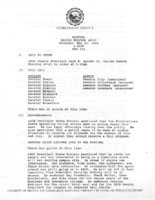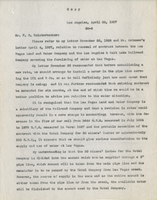Search the Special Collections and Archives Portal
Search Results
Robert List oral history interviews
Identifier
Abstract
Oral history interviews with Robert List conducted by Claytee D. White on December 10, 2018, January 11, 2019, May 3, 2019, May 7, 2019, and June 12, 2019 for the Boyer Early Las Vegas Oral History Project. In this interview, Robert List, former Governor of Nevada and Nevada Attorney General, recounts his early life and his summers spent on a family ranch in Northern Nevada. List details moving to Carson City in 1951, eventually practicing law, and recounts various experiences leading up to his political career. He elaborates on the events that happened during and after his term, including his involvement in an operation to clear the Mob out of many Las Vegas, Nevada hotels, such as the Tropicana, the Stardust, and the Riviera. List explains how his term helped Las Vegas move away from the influence of organized crime.
Archival Collection

Transcript of interview with Alice Ward Boyer by Joanne Goodwin, June 26, 1996
Date
Archival Collection
Description
Alice Ward Boyer arrived in Las Vegas from Oklahoma in 1937. Her brother and former husband came earlier to escape the dustbowl depression and get settled. In the middle of the summer, just at dusk, she emerged from the train at Kingman, Arizona with her two small children to meet her family and drive through the darkness to her new home in Las Vegas. Although she missed the trees of the Plains, she soon became accustomed to her desert home. Her recollections revive the older Las Vegas when community life characterized the small town. At the heart of her story is the Mesquite Club. The non-partisan civic activities of the Mesquite Club are part of a national history of women’s club voluntarism in the nineteenth and twentieth century United States. Founded in 1911, this pioneer Las Vegas women's club played an essential role in the development of the growing town. When few cultural or social services existed, the club raised funds for the first public library, developed parks for the city, and provided services and funding for the aged and youth. The Mesquite Club, along with the Parent Teacher Association, scouts, and church activities formed a network of community relations commonly found in developing towns and cities, but not ususally associated with Las Vegas. Alice Boyer joined the Mesquite club in 1944. She first served as the chair of the Garden Committee, then "went right up through the chairs," and was elected President of the club for 1958-59. (See Table of Offices Held). Speaking about the Mesquite Club founders, Alice Boyer said, “They were very forward-looking women. They knew that the town would grow and they wanted the best for the town.” As one of the second generation of members, she has found the club to be a continuing source of congenial social life and civic community building. Born in rural Oklahoma, she spent her early years on a ranch. Her parents met there shortly after "the run to open Oklahoma" around 1892. They met, married and had twelve children, nine of which survived. Alice came right in the middle. She spent her early years riding horses, wearing “overalls," and spending as much time as possible outside. The family moved into Clinton, Oklahoma for better schools for their children when she was in the fifth grade. Alice graduated from high school just as the Great Depression began and worked briefly at a newspaper before marriage. At the time of the interview, Alice Boyer’s vivaciousness, gracious manner, and sharp memory belied her 82 years. This interview has been produced with the assistance of the Mesquite Club and the History Department of the University of Nevada, Las Vegas. It is part of a series on women community builders in Las Vegas. The transcript has been edited only slightly for clarity while the syntax and style of the narrator were retained.
Text

Transcript of interview with Alma Athella Huffman by R.A. Grau, March 2, 1972
Date
Archival Collection
Description
On March 2, 1972, collector R. A. Grau interviewed former Justice of the Peace, Alma Athella Huffman (born May 2nd, 1909 in Bunkerville, Nevada) in her daughter’s home in Las Vegas, Nevada. This interview covers the history of Southern Nevada. Alma also offers an in-depth description of early life in Bunkerville, Nevada.
Text

Transcript of interview with Neil Henry Holmes by James Greene, January 14, 1975
Date
Archival Collection
Description
On January 14, 1975, collector James Greene interviewed foreman, Neil H. Holmes (born on November 16th, 1897, in Chicopee, Kansas) in his home in Boulder City, Nevada. This interview covers the early days in Boulder City. Mr. Holmes also discusses the local education system, family life, employment opportunities, housing, and the building of Hoover Dam.
Text
Harmon Family Papers
Identifier
Abstract
The Harmon Family Papers consist of the political and personal correspondence of Las Vegas, Nevada pioneer Harley A. Harmon from 1910 to 1934, and his son, Harley E. Harmon, from 1950 to 1966. The collection also includes correspondence, personal papers, and photographs of Harley L. Harmon from approximately 1950 to 1999. Also included are family scrapbooks with wedding announcements, photographs, birthday cards, newspaper clippings, and other ephemera.
Archival Collection

Meeting minutes for Consolidated Student Senate University of Nevada, Las Vegas, May 26, 1988
Date
Archival Collection
Description
Text

Letter from F. R. Adamson (Los Angeles) to F. H. Knickerbocker, April 22, 1927
Date
Archival Collection
Description
A suggestion that although the renewal of the agreement between the Railroad and the Las Vegas Land and Water Co. was unimportant, since both were wholly owned by the Union Pacific, they should take the opportunity to use meters to figure out how much water the water company was using.
Text

Report of Las Vegas water during fourteen years, 1957
Date
Archival Collection
Description
Overview of fourteen years of water use in the Las Vegas Valley showing water sales and consumption in gallons.
Text
Audio clip from interview with Courtney Hunt by Claytee D. White, October 2, 2013
Date
Archival Collection
Description
In this clip, Mr. Hunt, also known as "Nutt," explains how the CONVICTS motorcycle club was named, the acronymn meaning and overview of membership community activities.
Sound

